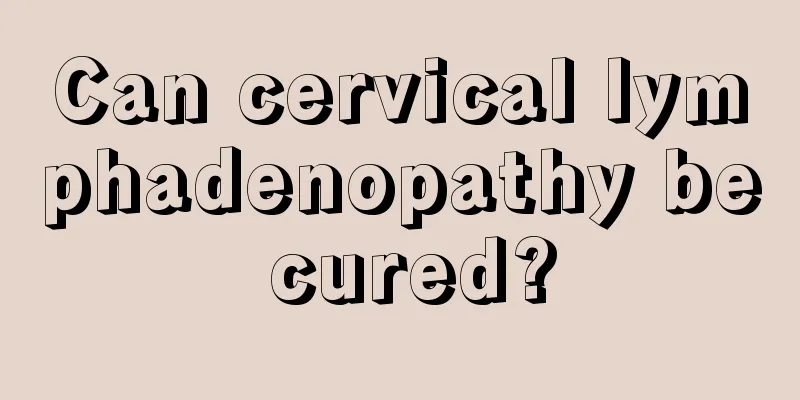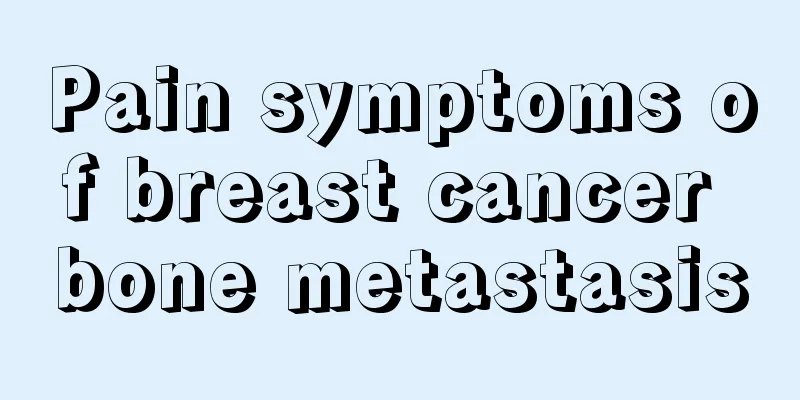Can cervical lymphadenopathy be cured?

|
Cervical lymph tuberculosis is a very common neck disease in life. It is usually caused by long-term inflammation of the body or long-term neglect of diet. Large lumps will appear on both sides of the neck, affecting physical health. Lymph tuberculosis needs timely treatment and can be cured by taking medication on time. If the condition is serious, it can be treated surgically. Can cervical lymphadenopathy be cured? Tuberculosis of cervical lymph nodes can be cured and requires long-term treatment with anti-tuberculosis drugs. In this case, it is best to go to a tuberculosis specialist hospital for regular treatment and take long-term medication for prevention. If there are local lesions, surgical resection can be considered. Clinical manifestations 1. A small number of patients may have symptoms of systemic poisoning such as low fever, night sweats, loss of appetite, and weight loss. 2. There are usually multiple enlarged lymph nodes of varying sizes located at the anterior and posterior edges of the sternocleidomastoid muscles on one or both sides. As described in the overview, the above-mentioned lesions at different stages may appear simultaneously in the lymph nodes of the same patient. Differential diagnosis Diagnosis 1. Adolescent patients who have recent symptoms of systemic poisoning such as low fever, night sweats, weight loss, loss of appetite, etc. 2. There are multiple enlarged lymph nodes at the anterior and posterior edges of the sternocleidomastoid muscle on one or both sides, or as described in the overview, the above-mentioned lesions at different stages appear simultaneously in the lymph nodes of the same patient. 3. Perform biopsy to confirm the diagnosis if necessary. Disease treatment Treatment principles 1. Pay proper attention to nutrition and rest. 2. Systemic anti-tuberculosis treatment. 3. Treatment of local tuberculous lymph nodes. A small number of localized, larger, and movable lymph nodes can be removed surgically. For those with cold abscesses, ulcers or sinus tracts, the pus can be drained and anti-tuberculosis drugs can be injected into the cavity, or the tuberculosis lesions can be removed and the dressings replaced with anti-tuberculosis drugs and wait for the wound to heal. If necessary, surgical removal can also be performed. Medication principles 1. For early mild cases, isoniazid can be taken orally for half a year to a year, and streptomycin can be injected intramuscularly for 1-2 months. 2. If there are still a few localized, larger, and movable lymph nodes after the above-mentioned tuberculosis treatment, they can be surgically removed. 3. Patients with cold abscesses, chronic fistulas or sinus tracts can use rifampicin or rifadin alone or in combination. |
<<: What should I do if I have a fever due to lymph node tuberculosis?
>>: How to treat Propionibacterium acnes
Recommend
Differentiation between nasopharyngeal carcinoma and rhinitis
In the early stage of nasopharyngeal cancer, ther...
What will happen if you don't eat rice for a month
It is very wrong not to eat rice for a month. It ...
Sugar ratio of homemade wine
After entering the 21st century, Chinese people a...
How to use papaya to soak your feet
We can add some medicinal prescriptions when soak...
What kind of pillow core is good
Having a good pillow that suits you can help you ...
What are the hazards of air pollution to human body
Although the domestic air has been effectively co...
Early symptoms of skin cancer should be discovered carefully
Although skin cancer is only a disease that can c...
Why does pain occur during intercourse?
Sex life is supposed to be a very happy thing, bu...
What are the benefits of adding rock sugar to white wine
Drinking is actually a skill. Anyone with a good ...
What are the early signs of laryngeal cancer?
In recent years, laryngeal cancer has become a ma...
A simpler way to judge endometrial cancer
There is no simple way to diagnose endometrial ca...
What are the pros and cons of stenting for cerebral infarction
After a disease like cerebral infarction occurs, ...
What are the conventional drugs for teratoma
Many teratoma patients are very nervous after bei...
How to prolong life with small cell lung cancer
Nowadays, more and more people do not pay attenti...
How to wear garter stockings
Garter stockings are mainly composed of two parts...









